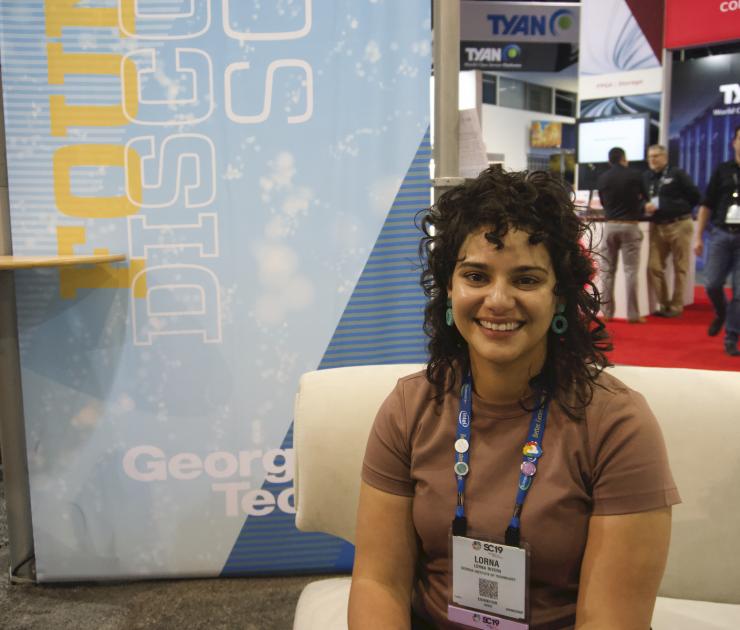Every year, thousands of researchers flock to Supercomputing (SC), the leading conference for high-performance computing (HPC) research, to present best practices and findings in the HPC field. Groups focused on creating inclusive measures in the HPC community have been steadily growing over the past few years at SC, and Georgia Tech’s own Lorna Rivera is a catalyst for several of these initiatives.
Rivera is a research scientist at Georgia Tech’s Center for Education Integrating Science, Mathematics, and Computing (CEISMC) and for the Women in High Performance Computing (WHPC).
Her research for both of these programs helps aggregate and analyze data in meaningful ways to determine custom-tailored approaches to advance initiatives focused on minority or underserved groups.
After providing a booth talk detailing initiatives in CEISMC and WHPC during SC19, the School of Computational Science and Engineering had the opportunity to discuss with Rivera updates on her latest efforts.
[Related News: Diversifying the HPC Community: Q&A with Georgia Tech’s Lorna Rivera]
For those unfamiliar, can you give a CEISMC from 30,000-foot view?
CEISMC connects Georgia Tech to surrounding K12 schools, focusing on underserved and minority areas, and works to move the needle in the state of Georgia to improve representation in the scientific areas of STEM and computing. It is led by Dr. Lizanne DeStefano who has a reputation for not only pushing those programs but also in evaluating their effectiveness.
A lot of what CEISMC does is focused on evaluation of these programs. Can you tell us a what this evaluation looks like and what you are looking for?
Evaluation can mean a lot of things and it differs from research, although you can do both research and evaluation. Evaluation differs in that you want to have a deep understanding of the context in which you are working. In research, you often want to wash out context because you want to be able to replicate things, and you can do that with evaluation too, they’re not completely separate boxes. But sometimes in evaluation, you study things not necessarily with the intention of replicating but because you want to understand the unique factors of that particular situation.
What kind of communities are you looking to serve or help enhance in your initiatives?
I personally try to always pay attention to those who are underserved in a particular community. I use an evaluation approach that accounts for what we look at in thirds. So, one third is focused on the quality of science being done, another third is focused on the way that science is being taught, and the remaining third is focused on the disadvantaged in that group that is being served. Then, in the middle, if you think about it like a Venn Diagram, those three come together and that is where you find the program and evaluation.
For more information about the approach, which was pioneered by CEISMC Executive Director Lizanne DeStefano, click here.
Does this approach transcend or translate to your efforts with the WHPC program?
Absolutely! I am the director of research for Women in HPC and it’s an organization that started at the University of Edinburgh’s EPCC and it is now an international organization. My role with WHPC is to understand the unique experiences of women in the international HPC community. You may notice that women of color are extremely underrepresented in this community, so, I am particularly passionate about moving the needle in this space. It is very important to me and, the way that we can accomplish this is, yet again, by evaluation. The WHPC programs are all new and are being rolled out now, so I am in the initial phases of evaluating. We have the mentoring program, which I got to talk about today in the Georgia Tech booth, we have a fellowship program that we just started, and we have our first three fellows with us this year. Then we are looking to broaden and see what else we can do in this space while growing sustainably because we do not want to grow too fast.
This sounds like WHPC has a lot going on – not to mention your first inaugural event is coming up! Can you tell us a little about it and what to expect?
We have our first Women in HPC Summit at the end of April and early May that is going to be held together with Simon Fraser University and will be held in Vancouver, Canada. We are very excited! There will be a series of technical talks, workshops, and tutorials. Sometimes, we hear from our members that they do not want to focus on the technical content and rather they want to focus on the experience of women, or vice versa and that they want to focus on the technical. We are hoping, now that we have our own event and are not limited to a one-day workshop, we can meet both of those needs.
Is there anything else you want to stress to people regarding the WHPC?
If you are interested in this topic, regardless of your gender, WHPC is for everybody. We need everybody involved and as many advocates as possible. Please don’t let the name turn anyone off, we are open to all and we want to make this a better space for everyone!

